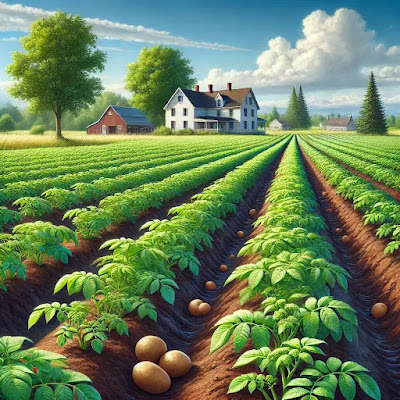Unlocking the Benefits of Smart Farming
In the ever-evolving landscape of agriculture, innovation is the key to sustainability and productivity. We, as proponents of cutting-edge technologies and progressive farming methods, are here to introduce you to the incredible world of Smart Farming.
 |
| [Smart Farming (A Rapeseed Field) Credit:Pexels] |
This revolutionary approach to agriculture is not only reshaping the way we cultivate crops but also redefining the future of food production.
In this comprehensive guide, we will delve deep into the intricacies of Smart Farming and reveal the myriad benefits it brings to the table.
What is Smart Farming?
Smart Farming, often referred to as precision agriculture, is a modern farming technique that harnesses the power of technology, data, and automation to optimize agricultural processes.
It involves the integration of various technologies, including the Internet of Things (IoT), artificial intelligence, and data analytics, to make farming more efficient, sustainable, and profitable.
Precision in Practice
One of the fundamental principles of Smart Farming is precision. It allows farmers to make data-driven decisions with pinpoint accuracy. For instance, sensors placed throughout the fields collect data on soil moisture levels, nutrient content, and weather conditions in real-time.
This data is then analyzed to determine the exact amount of water, fertilizer, and pesticides needed for optimal crop growth.
By minimizing waste and maximizing resource efficiency, Smart Farming helps farmers boost their yields while reducing their environmental footprint.
Key Benefits of Smart Farming
Now, let's dive into the myriad benefits that Smart Farming brings to the agricultural world:
1. Increased Productivity
Smart Farming techniques empower farmers to make informed decisions about planting, harvesting, and resource allocation.
By optimizing these processes, farmers can significantly increase their crop yields, ensuring a steady supply of food to meet the demands of a growing population.
2. Resource Efficiency
In conventional farming, valuable resources like water and fertilizer are often wasted. Smart Farming minimizes resource wastage by delivering the right inputs to crops precisely when they are needed. This not only conserves resources but also reduces production costs.
3. Sustainability
As the world faces the challenges of climate change and environmental degradation, sustainability is paramount in agriculture.
Smart Farming practices promote sustainability by reducing greenhouse gas emissions, conserving soil quality, and minimizing the use of harmful chemicals.
4. Data-Driven Decision Making
Smart Farming provides farmers with a treasure trove of data that can be used to make intelligent decisions. From predicting crop diseases to optimizing planting schedules, data analytics play a crucial role in modern agriculture.
5. Cost Reduction
By minimizing waste and improving resource management, Smart Farming ultimately leads to cost savings. Reduced input costs and increased yields translate to higher profitability for farmers.
6. Improved Quality Control
With real-time monitoring and data analysis, Smart Farming allows farmers to maintain strict quality control over their crops. This is especially important in the production of high-value crops like fruits and vegetables.
Smart Farming in Action
To illustrate the transformative power of Smart Farming, let's take a closer look at a real-world example:
Case Study: The Johnson Family Farm
The Johnson Family Farm, located in the heart of the Midwest, embraced Smart Farming with open arms. By implementing precision agriculture techniques, they achieved remarkable results.
Their crop yields increased by 30%, and water usage was reduced by 20% due to efficient irrigation practices. Moreover, they slashed their pesticide usage by 40%, leading to healthier, more sustainable farming.
The Future of Agriculture
As technology continues to advance, Smart Farming is poised to become the cornerstone of modern agriculture.
Its ability to increase productivity, conserve resources, and promote sustainability is nothing short of revolutionary. The benefits it offers to farmers and the planet as a whole are undeniable.
In conclusion, Smart Farming is not just a buzzword; it's a game-changer in the world of agriculture. It empowers farmers to optimize their operations, reduce costs, and produce higher-quality crops while ensuring the long-term sustainability of our food supply.
As we move forward, embracing Smart Farming is not only a smart choice but a necessary one to feed the world's growing population and protect our environment.

.png)

Comments
Post a Comment